|
|
|
Sort Order |
|
|
|
Items / Page
|
|
|
|
|
|
|
| Srl | Item |
| 1 |
ID:
148381
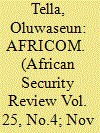

|
|
|
|
|
| Summary/Abstract |
The United States (US) Africa Command (AFRICOM) was launched in 2007, ostensibly to foster African security. Rather than focusing on traditional military operations, AFRICOM also embraces non-military activities such as humanitarian aid and African development. This begs the question as to what type of power (hard or soft) the US intends to wield through AFRICOM. Several US official statements have emphasised the soft power attributes of this military project. To this end, this article seeks to respond to two fundamental questions. First, is AFRICOM a soft power project? Second, how, if at all, has AFRICOM enhanced perceptions of the US in Africa? The article concludes that sceptical and negative perceptions of AFRICOM inhibit its soft-power objective of winning the hearts and minds of the African people.
|
|
|
|
|
|
|
|
|
|
|
|
|
|
|
|
| 2 |
ID:
161617
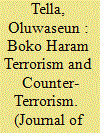

|
|
|
|
|
| Summary/Abstract |
Given terrorists’ use of violence in pursuit of their objectives and violent counter-terrorism measures, terrorism is not often associated with soft power. Nevertheless, terrorist organisations subscribe to ideologies that are appealing to certain individuals and/or segments within their immediate environment and beyond. Similarly, counter-terrorism initiatives that embrace the utility of soft power might be more successful than those that rely on the use of naked force. While the soft power of terrorist organisations has received scant attention, there has been modest scholarly inquiry into a soft power approach to counter-terrorism. However, no comprehensive research has been conducted on the place of soft power in Boko Haram’s activities and the Nigerian government’s efforts to end their campaign. This article offers a new perspective to the burgeoning literature on Boko Haram terrorism by examining whether or not it possesses elements of soft power that are appealing to certain Nigerians. It also examines if the Nigerian government has adopted a soft power approach in its counter-terrorism efforts. The article concludes that effectively tackling the sect will require a smart power strategy
|
|
|
|
|
|
|
|
|
|
|
|
|
|
|
|
| 3 |
ID:
186877
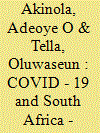

|
|
|
|
|
| Summary/Abstract |
While South Africa–China relations were only formalized in 1998, relations between these states date back to the 1800s. South Africa's quest for sustainable development through partnerships with global powers motivated its close ties with China. The 2015 Cape Town Declaration committed the two countries to improve health facilities and disease control. The coronavirus (COVID-19) pandemic presents an opportunity to rethink this partnership. Drawing on desktop research, this article engages the reality of COVID-19 and explores South Africa–China relations in the context of the pandemic. The emergence of the virus in China, its rapid spread, and the high fatality rate have had devastating repercussions across the world. This article argues that Beijing's response to COVID-19 raises more questions than it answers. The outbreak of the virus in China, its response, and emerging cases of racism and xenophobia against Africans in China also raise concerns about the future of South Africa–China relations.
|
|
|
|
|
|
|
|
|
|
|
|
|
|
|
|
| 4 |
ID:
159770


|
|
|
|
|
| Summary/Abstract |
Despite increasing interest in South Africa’s soft power in recent years, little analysis is offered on the factors that hinder the projection of such soft power. Most studies have focused on the sources and the optimization of South Africa’s soft power. While this article gives a synoptic account of these sources, it offers a different perspective by engaging the constraints and contradictions that hinder and circumscribe its soft power projection. The article concludes that, in order to maximize its soft power projection, Pretoria must address the impediments that continue to undermine its power of attraction.
|
|
|
|
|
|
|
|
|
|
|
|
|
|
|
|
| 5 |
ID:
154776
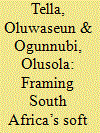

|
|
|
|
|
| Summary/Abstract |
South Africa arguably stands well above its regional counterparts in terms of soft power resources. This is not entirely unconnected with the uncalculated attempts by non-state actors to extend the reach of the country’s soft power status across the world. This article probes the contributions of the informal drivers of South Africa’s soft power. These ‘soft powered’ institutions and individuals (with no definite state affiliation) are critical contributors to South Africa’s soft power diplomacy. The country’s soft power is in part driven by the unintended outcome of the actions of a wide variety of non-state actors including civil society, the media, iconic individual personalities and multinational corporate entities. The article argues that South Africa can realise its greater foreign policy ambition and cement a benevolent hegemonic profile in Africa by focusing on specific roles that its informal soft power sources can play. Therefore, as an emerging power, South Africa is well placed to harness the substance inherent in its soft power instruments and resources by paying attention to these unofficial soft power sources but also strategically fine-tuning the same with official policy goals in subtly achieving Pretoria’s ambitions as a key player in international political discourse.
|
|
|
|
|
|
|
|
|
|
|
|
|
|
|
|
| 6 |
ID:
186847
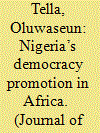

|
|
|
|
|
| Summary/Abstract |
Democracy promotion is undoubtedly one of Nigeria’s most important foreign policy objectives in Africa. Indeed, it has featured in the state’s foreign policy across successive administrations including military and civilian regimes. A fundamental question explored by this article is the dimension of power Nigeria deploys in its foreign policy objective of democracy promotion in Africa. Is it hard or soft, or a combination of the two (smart power)? Using three case studies – Sierra Leone, São Tomé and Príncipe and The Gambia – the article reveals that Nigeria has deployed all three dimensions of power. While this reflects the peculiar circumstances of these particular states in constitutional crisis, Nigeria’s domestic situation, including the type of political system (democratic or authoritarian) and the personality of the president at a given time, as well as trends in the global arena, are also germane. By its very nature, democracy promotion depends on a state’s soft power as the admirable domestic values of the soft power state attract other states to emulate its democratic practices. However, as the case study of Nigeria shows, a state can deploy soft, hard or smart power in its quest to promote democracy depending on the domestic circumstances of both the soft power and recipient states.
|
|
|
|
|
|
|
|
|
|
|
|
|
|
|
|
| 7 |
ID:
185521
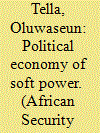

|
|
|
|
|
| Summary/Abstract |
In recent times, the concept of soft power has emerged as one of the most important terms in international relations. It has been applied to various aspects of statecraft from democracy promotion to peace-making, cultural diplomacy, economic diplomacy, counter-terrorism and disaster management, to name but a few. However, there is a dearth of literature on the political economy of soft power. Given that economic interests substantially drive states’ foreign policies, it is surprising that this aspect of states’ power of attraction has been neglected. It is against this backdrop that this article examines the political economy of soft power focusing on South Africa. In doing so, it engages South Africa’s neo-liberal order and the influx of its multinational companies in Africa and submits that despite the criticism it encounters in this regard, Pretoria has exercised soft power within the purview of political economy.
|
|
|
|
|
|
|
|
|
|
|
|
|
|
|
|
|
|
|
|
|